The Sustainable Development Goals form the core of a “shared blueprint for peace and prosperity for people and the planet, now and into the future” and are part of the United Nation’s 2030 Agenda for Sustainable Development.
As COVID-19 forced travel and tourism operators to reshuffle their business priorities for 2020, sustainability was a matter placed on the back burner by businesses. For some businesses, sustainability has long been a low-priority concern because travellers were not demanding it and nor were governments or regulatory authorities.
In June this year, WYSE Travel Confederation’s COVID-19 Travel Business Impact Survey found that sustainability messaging to consumers was of a low priority for travel and tourism businesses and particularly low for those specialised in youth travel. Those businesses most likely to have been communicating their sustainability practices were from the tours, activities & attractions sector.
In September, the COVID-19 Travel Business Impact Survey[1] asked youth travel and tourism businesses about their contribution to the 17 Sustainable Development Goals (SDGs). While the potential for young travellers to become early-adopters and ambassadors of responsible, sustainable travel behaviours is often recognised, findings from various WYSE Travel Confederation research projects over the last two decades suggest that more concerted and diligent efforts to monitor, quantify and improve the youth travel industry’s contributions to the Sustainable Development Goals are needed. Findings from the current survey suggest that while many respondents make some contribution to the SDGs, the contributions are unevenly distributed across world regions and travel sectors.

Organisations in the volunteer travel sector were most likely to be contributing to the SDGs and those in the work experience travel sector the least.
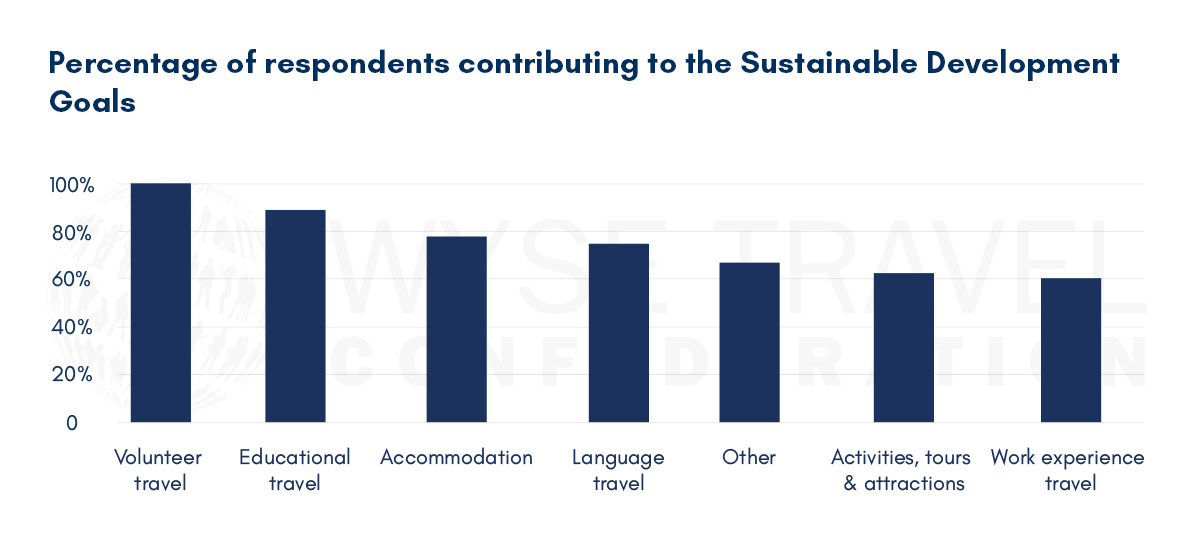
The volunteer travel sector also contributed to more SDGs on average than other youth travel sectors.
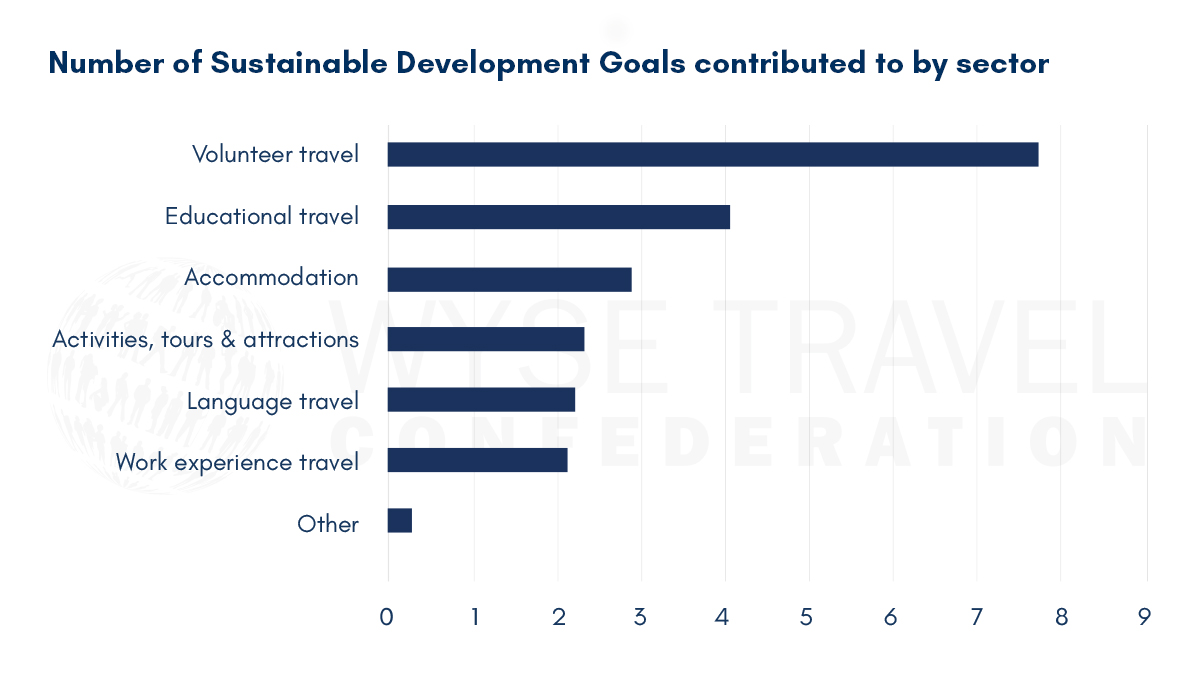
The strong link between the SDGs and volunteer travel also meant that the respondents with the most involvement in the Sustainable Development Goals were more likely to be located in the world regions of Africa and Central & South America.
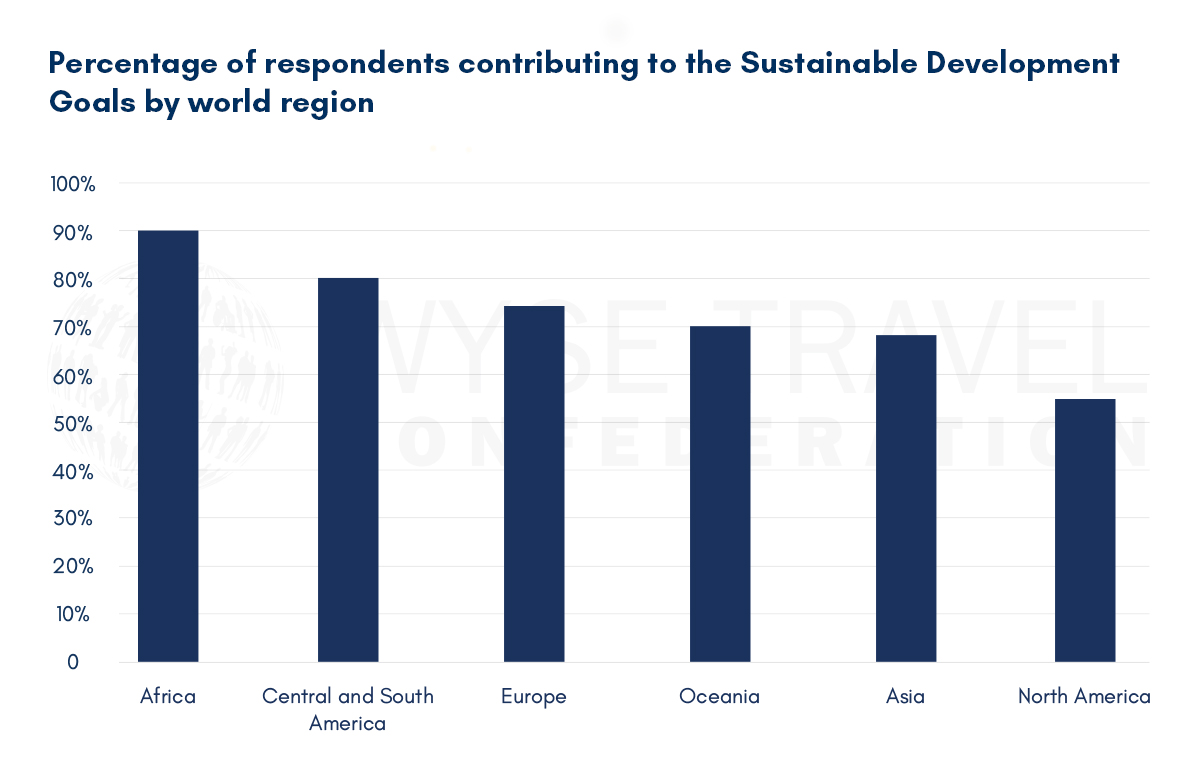
Africa and Central & South America were also the world regions where youth travel and tourism organisations contributed to the largest number of SDGs on average. This seems to suggest that the most actively contributing organisations and businesses within tourism are those that also have development agendas within emerging economies. This uneven balance of contributions amongst world regions may also suggest that the message of sustainability has not been effective at a global level or for advanced economies in particular.
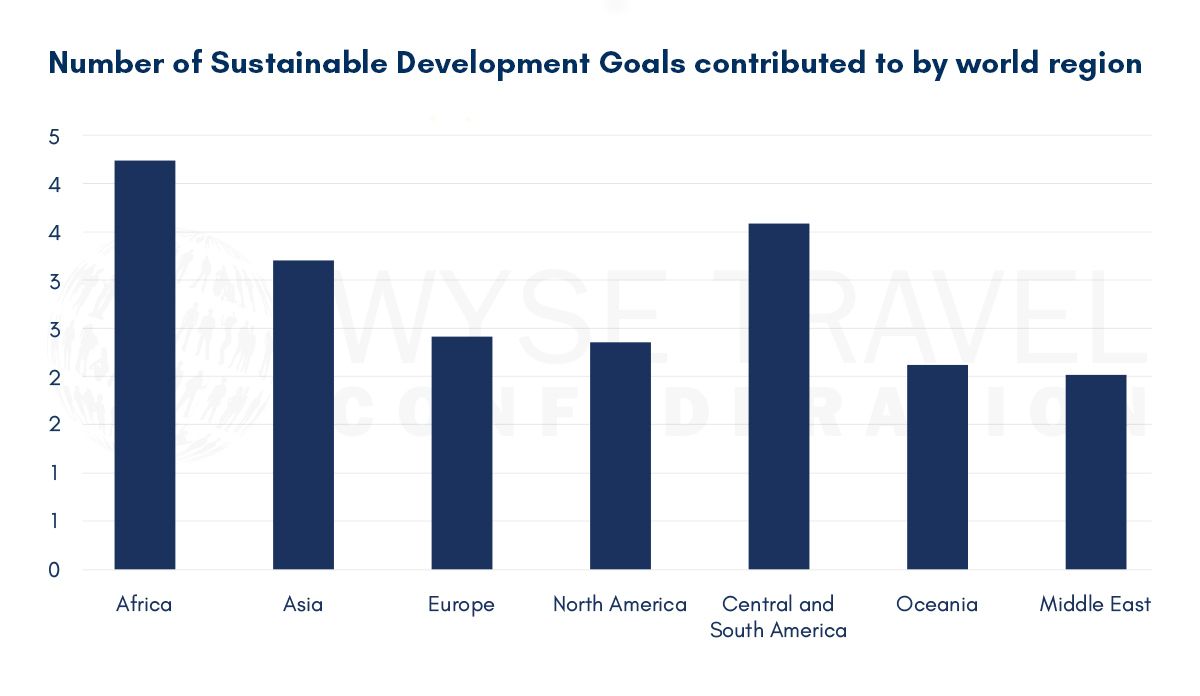
Only a minority of respondents reported actively monitoring their contribution to the Sustainable Development Goals. Monitoring and evaluating sustainability practices is a general problem across the tourism and hospitality industries, according to Jones, Hillier and Comfort:
“Potentially the leading companies within the tourism and hospitality industry are in a powerful position to contribute to the successful achievement of the SDGs. However, if the industry is to play an important role in promoting the transition to a more sustainable and equitable future, the leading players within the industry will face a number of challenges to the way they currently conceptualise and manage their sustainability strategies and their sustainability reporting processes.[2]”
According to WYSE Travel Confederation’s COVID-19 Travel Industry Business Survey, just 12% of respondents use a structured framework for monitoring, and a further 30% monitor without a structured framework.
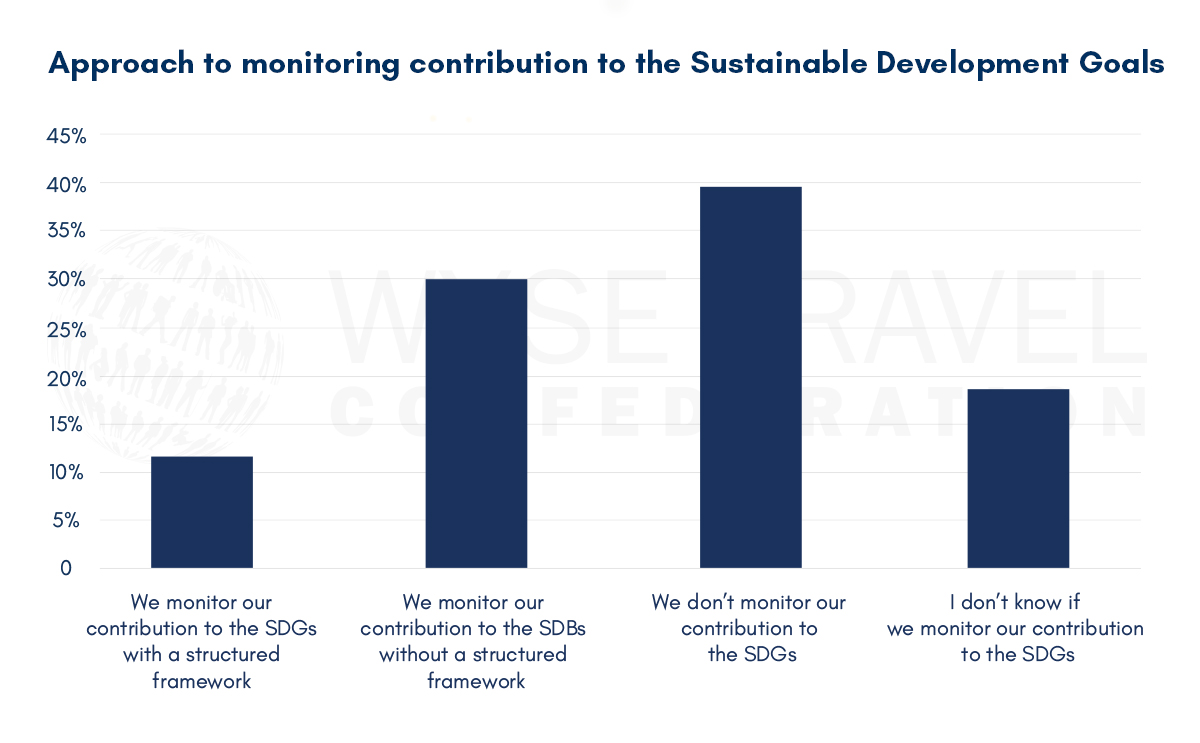
Even fewer organisations publicly report on their contributions to the SDGs (9%). Of those publicly reporting, the vast majority are in the accommodation, volunteer travel and educational travel sectors.
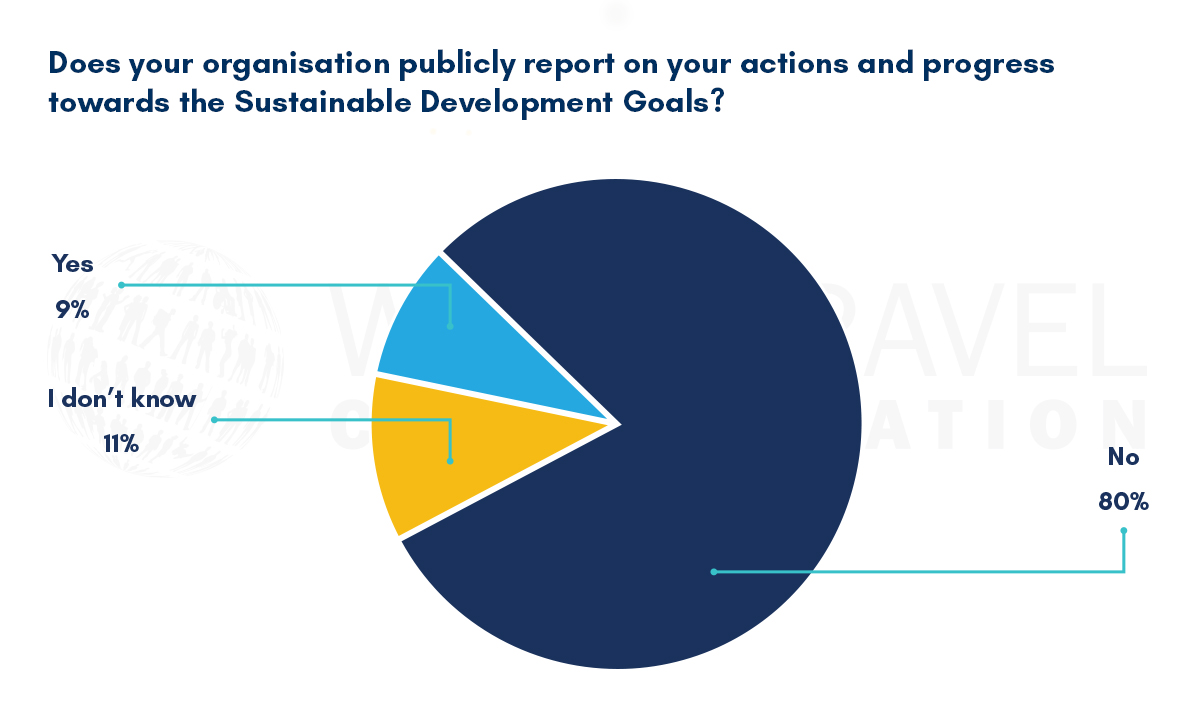
The Youth Travel Industry and COVID-19
To learn more about COVID-19’s impact on the youth and student travel industry, read our report The Youth Travel Industry and COVID-19. The report provides a summary of survey results derived from WYSE Travel Confederation’s COVID-19 Travel Business Impact Survey for the period March – August 2020. Change in demand, business concerns, consumer messaging, digital shift, business recovery outlook and many other topics are covered.
WYSE Travel Confederation
If your business would benefit from unique business insights on the youth travel market, industry representation for common business interests and new trading opportunities with international partners, we invite you to discover the resources of the global trade association for businesses serving young travellers, WYSE Travel Confederation.
[1] Data for this report were collected between 4 and 13 September 2020 by WYSE Travel Confederation, the global association for youth, student and educational travel organisations, via web-based questionnaire in English. The September survey was the seventh in the series.
The September survey attracted 338 responses from 69 countries. Three-hundred and eighteen responses were retained for analysis. Respondents included organisations specialised in youth travel products as well as those representing mainstream travel products, members and non-members of the association. All respondents were asked about the impact that the COVID-19 (Coronavirus) pandemic has had on their business in travel. Questions related to change in demand, outlook for 2020, main concerns and actions taken in response to COVID-19 have been repeated across surveys.
The profile of respondents has remained similar from month to month during this survey series. Youth travel specialists, defined as those organisations with over half their main business in the youth market, have consistently made up 60% or more of respondents over the course of the survey series.
[2] Jones, P., Hillier, D., & Comfort, D. (2017). The sustainable development goals and the tourism and hospitality industry. Athens Journal of Tourism, 4(1), 7-18.

